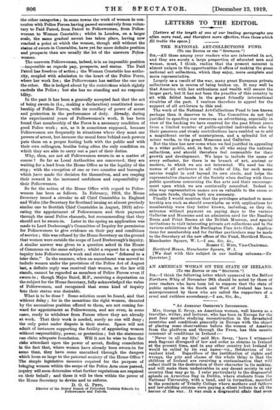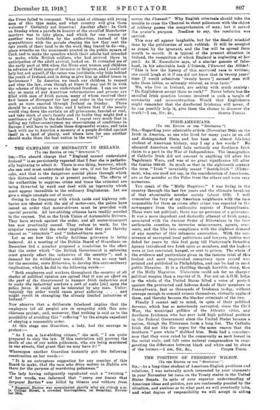" AN AMERICAN OBSERVER'S IMPRESSIONS.
Mrs. George E. Sevey, an American woman, well known as a traveller, writer, and lecturer, who has been in Europe for the past four months studying reconstruction in the devastated countries and conditions generally in Europe with the object of placing some observations before the women of America from the platform and through the Press, has this caustic comment of conditions in Ireland
Never in all my life,' said Mrs. Sevey, have I witnessed such flagrant disregard of law and order as obtains in Ireland at the present time, and in any other country but Ireland it would be called by its real name—viz., Bolshevism of the
rankest kind. Regardless of the justification of rights and wrongs, the pity and shame of the whole thing is that the children of Ireland are receiving a contamination that will reflect itself in the destruction of their character in its making, and will make them undesirables in any decent society in any country they may go to. I refer particularly to the disgraceful episode on Armistice Day in Dublin, where students from the National University, with a band, and in formation, marched to the precincts of Trinity College where mothers and fathers and law-abiding citizens were paying a silent tribute to all the heroes of the war. It was such a disgraceful affair that even
the Press failed to comment. What kind of citizens will young men of this type make, and what country will give them welcome P Certainly not America! Another affair : In Cork on Sunday when a parade in honour of the so-called Manchester martyrs was to take place, and which for one reason or another was forbidden by the authorities, instead of the sympathizers with the parade obeying the law they sent the fair youth of their land to do the work they feared to do—viz., place wreaths on the monument erected in the public square of Cork and to make the speeches which their adults had intended to make, while British soldiers, who had arrived there in anticipation of the adult arrival, looked on. It reminded me of the early part of 1914 when the Huns sent women and children in advance of their army of invasion in Belgium, and I could not help but ask myself, if the cause was justifiable, why hide behind the youth of Ireland, and in doing so give him an added lesson in lawlessness ? In America we teach our children to respect and obey the law, even though at times it may not fit in with the scheme of things as we understand freedom. I can see now why so many of our American reformatories and prisons are filled with men of Irish names, many of whom received their first lesson of disregard for law and order in the very events such as were enacted through Ireland on Sunday. There should be a solution to this; and I believe that if the people would ring down the curtain on all grievances, fancied or real, and take stock of one's family and its faults they might find a semblance of light in the darkness. I regret very much that in telling my fellow-countrymen my observations of conditions in Europe I will have to include these disgraceful events, and take back with me to America a memory of a people divided against itself in a land of plenty, and where love for one another should make them the best nation in the world. "



















































 Previous page
Previous page